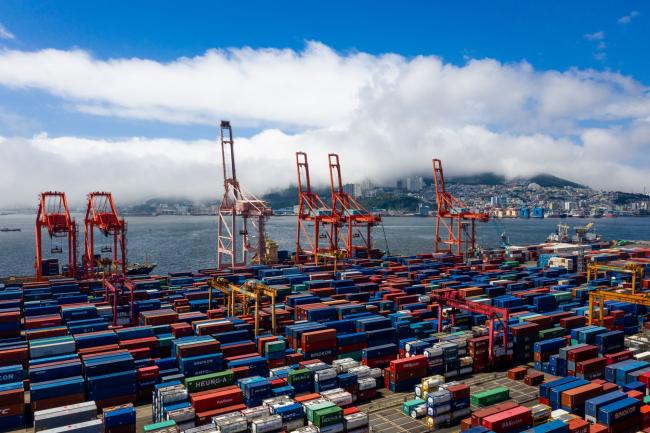(Bloomberg) -- Terms of Trade is a daily newsletter that untangles a world embroiled in trade wars. Sign up here.
South Korea’s economy grew at a slower pace in the third quarter, putting it on track for the smallest expansion since the global financial crisis as trade uncertainties weigh on investment.
Gross domestic product increased 0.4% from the previous quarter, the Bank of Korea said in a statement, compared with an estimate by economists of 0.5%. From a year earlier, the economy expanded 2%, as projected in a Bloomberg survey.
While exports rose in the quarter, improving from the sharp falls seen at the beginning of the year, the extended run of export weakness and doubts about the strength of overall growth are weighing on investment. Concerns over weakening investment provide another reason for the government and central bank to continue bolstering their support for the economy.
Following the BOK’s rate cut last week to support prices and growth, Governor Lee Ju-yeol said the effects of the trade war would likely trim South Korea’s economic growth by 0.4 percentage point this year.
That leaves the economy needing a sharp acceleration in the last three months of 2019 to stop growth from falling below 2%. An expansion of almost 1% in the fourth quarter will be needed to achieve that, with annual growth of 1.8% more likely, according to Cho Yong-gu, a fixed-income strategist at Shinyoung Securities.
The improvement in exports, which grew 4.1% in real terms from the second quarter, indicates that weakness in the global tech sector may be over the worst. The BOK noted growth in semiconductor and car shipments compared with the previous three months.
“There are some signs of a recovery in exports,” Cho said. “But the trade war has clearly taken a toll on shipments and falling exports have led to a slump in facilities investment.”
Governor Lee acknowledged the likelihood of growth falling below 2% in parliament after the release of the GDP data. With interest rates already at a record low Lee said the government’s fiscal policy had a role to play in boosting growth in the fourth quarter. Lee has said there’s no need for non-conventional policy support yet, though the central bank is looking at its options.
Bank of Korea in Easing Mode Spurs Speculation QE May Be Needed
President Moon Jae-in said earlier this week that an expansionary fiscal policy was essential over the coming year, given the economy’s “grave situation” amid the spread of trade protectionism.
Still, some economists said the central bank would have to keep playing its part as the government ramps up spending to prop up growth and prices, which recently began to fall.
“South Korea is where the world confirms the impact of the U.S.-China trade war on economic growth,” said Lee Sang-jae, chief economist for Eugene Investment & Securities. The problem for Korea is that because its small economy is so open to global trends, the power of fiscal policy is more limited than in other less export-reliant economies.
“Deflationary trends are growing chronic and the BOK faces a choice like other global central banks to pursue an aggressive monetary policy,” he said.
What Bloomberg’s Economists Say
“South Korea’s stepped-up policy support failed to offset downward pressure on the economy in 3Q from the U.S.-China trade war. A drop in investment and drag from net exports weighed on growth, while consumption slowed. We expect more policy support to shield the economy from external risks -- with fiscal policy taking the lead as the Bank of Korea’s policy ammunition runs low.”--Justin Jimenez, Bloomberg EconomicsClick here to read the report
(Adds comments from BOK governor and economists)

